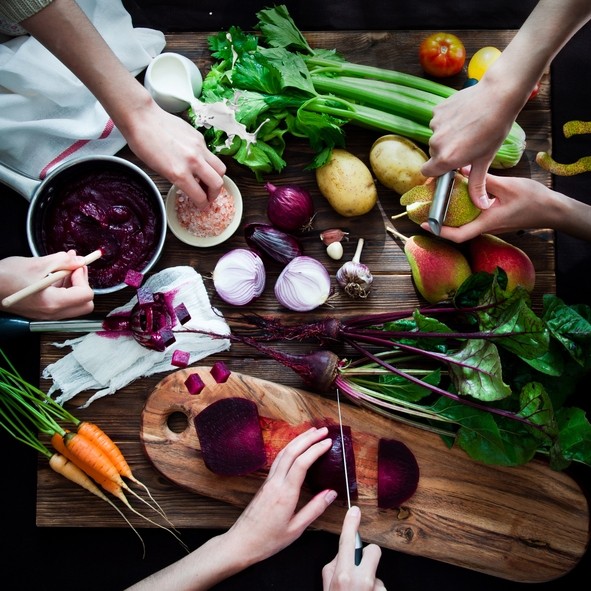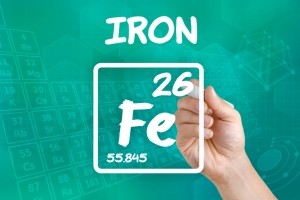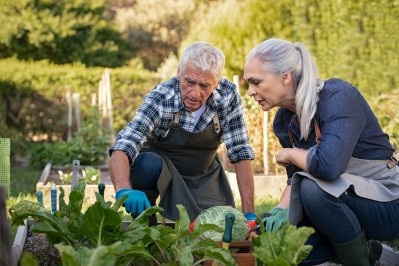Are vegan diets detrimental to children’s health and development?

Vegan diets are gaining traction in Europe, propelled by environmental and animal welfare concerns.
According to data from The Vegan Society, the number of vegans in the UK quadrupled between 2014 and 2019, albeit from a low base. In 2014, just 0.25% of the British population – 150,000 people – identified as vegans. This year, that number rose to 600,000 people, or 1.16% of the population.
This trend is leading to a rise in nutritional deficiencies among vegan children, according to Dr Patrick Tournian.
Writing in French newspaper La Figaro, Dr Tournian claimed paediatricians are seeing ‘more and more infants’ suffering from ‘severe deficiencies’ that have negative consequences for their development and health in later life.
Rather than placing the blame with parents, Dr Tournain – who concedes he has ties to the agricultural sector but maintains this does not impact his scientific opinion – believes the true culprit is a lack of reliable information. He argued that proponents of veganism frequently rely on ‘pseudo-scientific developments’ seeking to ‘reassure’ the public that vegan diets are nutritionally sound.
'The more restrictive the diet, the greater the risk'

Dr Mariette Abrahams, founder of Qina, a boutique personalised nutrition and wellness consultancy in Portugal, agrees that the vegan trend does present a nutritional challenge.
“While eating vegan for health or environmental concerns is certainly a good reason, following a vegan dietary pattern is not without nutritional risks for adults but even more so for growing children,” she told FoodNavigator.
“Nutrients that are of particular concern are: calcium, iron, zinc, iodine, vitamin D, vitamin B12, omega-3 fats and protein, which for a growing child are absolutely critical.”
Alex White, assistant nutrition scientist at the British Nutrition Foundation, echoed this danger. “There are some nutrients that may be more difficult to get from a vegan diet in young children such as vitamin B12, vitamin D, iron, iodine and calcium,” he told us. “The more restrictive a vegan diet, the greater the risk for nutrient deficiencies.”
Deficiencies can have important implications for childhood development.
For instance, a lack of vitamin B12 in children often presents itself with non-specific symptoms such as developmental delays, a diverging growth curve, irritability, neurological problems and weakness, according to Stichting B12 Tekort.
Meanwhile, iron deficiency can lead to anaemia, with symptoms ranging from fatigue, to slowed growth and development, behavioural problems and rapid breathing.
‘Well-meaning parents’ may lack information
The nutritional experts we spoke to were quick to stress that vegan diets will not necessarily result in nutritional deficiencies among children. The key is education and planning.
“Carefully, well-planned vegan diets can provide the nutrients children need. However, childhood is a time of rapid growth and development. It is very important that the diet is well balanced so children can get all the energy and nutrients they need to be healthy,” the BNF’s White suggested.
Dr Abrahams expressed a concern that not all parents who opt to raise their children as vegans will have the information and nutritional understanding needed to provide balanced diets.
“There is no doubt that parents who are well informed and educated on the nutritional risks can ensure that their growing child is eating a balanced diet containing foods that are rich in essential vitamins and minerals. However my concern is that well-meaning parents may not be,” she cautioned.
While it is ‘quite easy’ to search the internet and find iron-rich foods, for example, Dr Abrahams stressed that not all parents will be able to translate this information into dietary choices that are appropriate for ‘a small tummy’.
“I would be really impressed if a parent can tell me how much iron a child needs in a day, and what that looks like in terms of everyday food items. There is just not enough awareness or knowledge.”
Plant-based foods currently available on the market also present parents with another challenge. In order to achieve the desired taste and texture, many plant-based options are actually high in less desirable nutrients, such as salt.
“Plant-based foods may contain high quantities of salt, so understanding food labels is also very important,” Dr Abrahams noted.
“For growing children, foods need to be nutrient-dense, include a variety of whole grains, fortified products and contain a sufficient amount of protein, and even then, nutritional supplementation may still be required.”
‘Vegan or not, planning is essential’
The critique that vegan diets can result in nutritional deficiencies is an argument all too familiar to The Vegan Society, which promotes the uptake of vegan lifestyles.
For this reason, the organisation says it is vital that people are equipped with ‘scientifically sound advice’. And, as part of its mission, The Vegan Society works with the British Dietetic Association to ‘share the message that well-planned vegan diets can support healthy living in people of all ages’, The Vegan Society dietitian Heather Russell told FoodNavigator.
“Whether you’re vegan or not, nutritional planning is essential for giving your child a great start.
"By balancing food groups well and making good use of fortified foods and supplementation, you can provide a diet containing all the nutrients needed for growth and development without using animal products,” Russell said.
One thing all the experts agree on is that parents should seek support from a doctor or dietitian.
Dr Abrahams advised: “Seek the advice and support of a registered dietitian or registered nutritionist who can provide practical advice on which foods and quantities to include for your growing child.
“Track the growth and development of your child according to the advice of your healthcare professional. New technologies, such as video consultations or chat-based platforms, can make accessing a registered nutritionist or dietitian a lot easier without you having to leave your home.
“Finally, parents who have started their children on a vegan diet need to stay alert as nutritional deficiencies may not be obvious, these may include changes in mood or energy levels.”


























